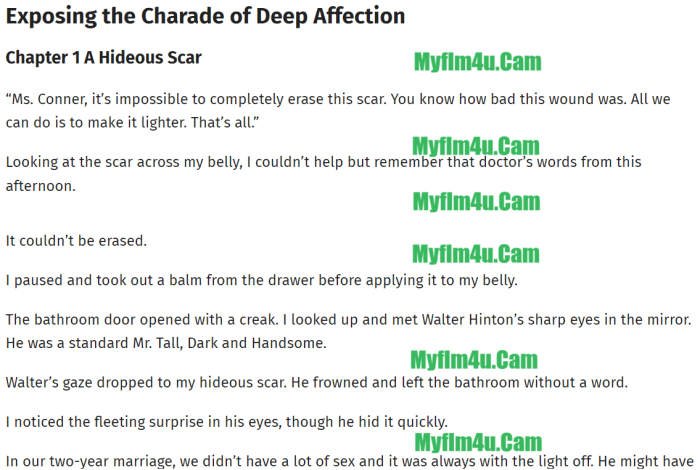Exposing the charade of deep affection delves into the deceptive nature of human relationships, unmasking the hidden agendas and psychological mechanisms that drive individuals to manipulate others through feigned emotions. This exploration reveals the warning signs of a charade, its devastating consequences, and empowering strategies for protecting oneself from emotional exploitation.
Unveiling the truth behind false intimacy, this discourse provides a roadmap for discerning genuine affection from its deceptive counterfeit, empowering individuals to navigate the complexities of human relationships with wisdom and discernment.
The Deceptive Nature of Deep Affection: Exposing The Charade Of Deep Affection

Deep affection can be a powerful emotion that binds people together. However, it can also be a facade, masking ulterior motives or hidden agendas. This charade of deep affection can be used as a manipulation tactic, creating an illusion of intimacy and trust to gain control or exploit others.
The psychological mechanisms behind this charade involve a combination of cognitive dissonance and self-serving bias. Individuals who engage in this behavior may genuinely believe their own expressions of affection, even while subconsciously using them for personal gain. This can lead to a cycle of manipulation and deceit, where the perpetrator maintains the charade to protect their own self-image and avoid facing the consequences of their actions.
Unveiling the Truth: Signs of a Charade, Exposing the charade of deep affection
Recognizing the signs of a charade of deep affection is crucial for protecting oneself from emotional harm. Common red flags include:
- Inconsistencies in behavior and communication
- Excessive flattery and praise that feels disingenuous
- Attempts to control or isolate the target of affection
- Sudden changes in affection levels or unexplained withdrawals
- A lack of empathy or genuine concern for the other person’s well-being
Consequences of the Charade
Exposure to a charade of deep affection can have significant emotional and psychological consequences. It can damage self-esteem, erode trust, and undermine relationships. Victims may experience feelings of betrayal, confusion, and isolation. The healing process after the charade is revealed can be challenging and requires time, self-reflection, and support from trusted individuals.
Protecting Yourself from the Charade
To protect oneself from the charade of deep affection, it is important to set clear boundaries and trust one’s instincts. Developing self-awareness and recognizing the warning signs of manipulation can help individuals avoid falling prey to this behavior.
| Step | Action |
|---|---|
| 1 | Identify and trust your own feelings |
| 2 | Set clear boundaries and communicate them assertively |
| 3 | Be cautious of excessive flattery or praise |
| 4 | Observe the person’s behavior over time for consistency |
| 5 | Seek support from trusted friends or family members |
Examples of Exposing the Charade
Exposing the charade of deep affection can be a difficult but empowering experience. Real-life case studies demonstrate the challenges and rewards of confronting the truth:
- In one instance, a woman discovered her partner’s true intentions when she noticed a pattern of controlling behavior and inconsistencies in his communication.
- Another individual realized the charade when they witnessed their friend suddenly withdrawing affection after a disagreement, revealing a lack of genuine empathy.
Exposing the charade requires courage and resilience, but it can lead to personal growth and the establishment of healthier relationships.
FAQ Summary
What are the common red flags of a charade of deep affection?
Inconsistent behavior, excessive neediness, love bombing, lack of empathy, and a pattern of idealization followed by devaluation are all potential red flags.
How can I protect myself from emotional manipulation through deep affection?
Set clear boundaries, trust your instincts, develop self-awareness, and seek support from trusted individuals or professionals if needed.
What are the psychological consequences of being exposed to a charade of deep affection?
Emotional distress, damage to self-esteem, trust issues, and difficulty forming healthy relationships can all result from exposure to false intimacy.



